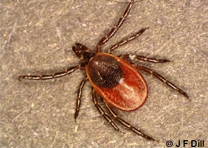You should be concerned about ticks in Maine, especially if you want to get outside to garden, walk in the woods, or sit on the patio. The two ticks in Maine most common are dog ticks and deer ticks. While dog ticks are bigger and get pretty disgusting when they fill with blood, it’s the deer ticks in Maine that pass Lyme disease.
Deer ticks are small, but fairly slow as they crawl around, looking for a tasty piece of bare skin. The good news: they have to attach for 24 hours in order to pass Lyme. (Not all deer ticks carry the disease.)
Avoiding Ticks in Maine
 This past winter, though cold, didn’t winterkill our tick population. Deer ticks have several hosts, including mice and deer. Common sense dictates that deer territory is also tick territory, so be especially wary in tall grass areas, or on the edges of your lawn. Right now, long-sleeve shirts, pants tucked into socks or tall boots, and permethrin-based tick repellent is a good idea. Later, when it’s warmer and shorts sleeves and shorts are in order, treat your shoes. Do a careful tick check of yourself and your pets after every trip outside. Be especially diligent about your hairline and armpits, two popular tick hangouts.
This past winter, though cold, didn’t winterkill our tick population. Deer ticks have several hosts, including mice and deer. Common sense dictates that deer territory is also tick territory, so be especially wary in tall grass areas, or on the edges of your lawn. Right now, long-sleeve shirts, pants tucked into socks or tall boots, and permethrin-based tick repellent is a good idea. Later, when it’s warmer and shorts sleeves and shorts are in order, treat your shoes. Do a careful tick check of yourself and your pets after every trip outside. Be especially diligent about your hairline and armpits, two popular tick hangouts.
I have actually seen ticks waiting on the end of tall grass in my garden beds, hoping for a passing meal. I’ve seen ticks navigating to get closer as I sit weeding, so I am especially careful about tick checks after I’ve been stationary for some time. I don’t like putting insecticides or repellents on my skin, so I treat my shoes and then shower carefully, using a scrubby brush and brisk washcloth and rinsing my hair.
One habit that’s helpful is to shower right when you come in from your gardening, and not wait until bedtime. Don’t give the ticks time to jump off on the couch while you watch the news!
Ticks in Maine Can Spread Lyme Disease
Don’t panic if you find an embedded tick. Remove it, and circle the bite with a pen or magic marker. Tape the tick to a card for identification. Watch the site carefully for the tell-tale bull’s eye rash of Lyme disease. If you really haven’t any clue how long the tick has been biting, ask your doctor about a prophylactic treatment of antibiotic.
Lyme Disease often starts with the rash and vague, flu-like symptoms. Untreated Lyme Disease might lead to neurological issues and arthritis-like symptoms.
The Maine.gov site has some great resources. The Lyme Disease Fact Sheet is a good starting place for people worried about ticks in Maine.